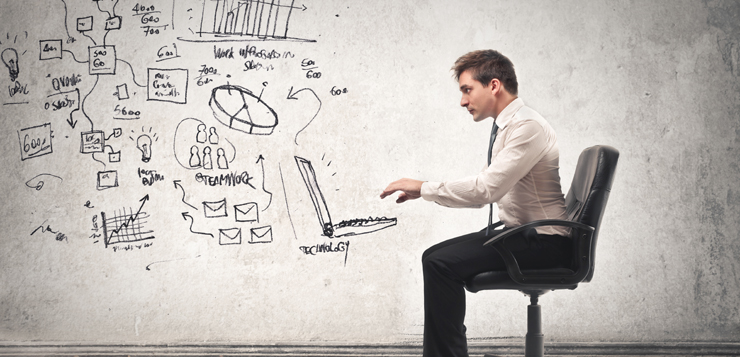It used to be when someone talked about being “at the office” they meant they were at an actual physical space. With the rise of workplace flexibility, global work teams, and technology to support a slew of telework options, “office” has become an elusive concept.
The number of “mobile workers” in the US will reach 105 million by 2020, estimates market intelligence firm IDC. That means almost three-quarters of our workforce will find themselves with flexible office situations. It’s no wonder, then, that many Fortune 500 companies are committed to attracting and retaining employees by offering flexible work environments and promoting diverse work styles.
Depending on what you do for a living and how you like to work, you will have your own unique definition of “office.” For some, office still means a physical space—like a desk or a cubical (or, for the free-spirited, their favorite café). For others, office means a device, like a tablet or phone. For these people, they’re “at the office” whenever their device is on and in their vicinity.
It’s easy to see how nontraditional work situations can take on a life of their own, and lead to more stress rather than more flexibility. That’s why it’s important to define what “flexible work” means to you.
For others still, office is a state of mind—it’s whenever you have work thoughts, which for many people is a lot of the time. It’s easy to see how nontraditional work situations can take on a life of their own, and lead to more stress rather than more flexibility. That’s why it’s important to define what “flexible work” means to you.
A recent study in the American Sociological Review found that workers with well-designed flexible work situations are less stressed, experience less burnout, and have increased job satisfaction compared to their peers in a typical workday situation.
Simply giving employees more control over their schedules and shifting emphasis to results rather than hours logged allows employees to be effective and happy. Go figure.
What’s imperative is that managers and employees work together to establish what is acceptable within the company or team culture. This is a huge opportunity to build trust and prevent confusion by discussing upfront what “office” means from the employer’s perspective. Then everyone can work together to construct what a workday at the office ideally looks like.
In order to have a balanced, mindful approach to flexible work situations, consider the following.
Three Steps For Defining “Flexible Work”
1 – Your Physical Space
If your office is an actual space, notice what you need in that space. If you work from home, is there a well-defined space in your house where “office” takes place, or do you “office” a little bit everywhere? If “office” means a device, ask yourself when do you engage and disengage with the “office” (your device): Is it a set time, like 7 p.m., or is it when you reach a specific physical destination?
2 – Your Mindset
If your office is a mindset, think about how you can intentionally tap into and let go of work thoughts. Perhaps you can establish a “stop work thoughts” saying that helps you bookmark the thought, for example, “Thank you, I will come back to this later.” Or you could intentionally take a few deep breaths to redirect your energy, or try to set a concrete time when work thoughts are just not welcome.
3 – Your Time
When does “office” begin and end for you? Flexibility is about choice, and if the choice is to be always on, the power of flexibility is diminished. Embrace and enjoy the flexibility to work wherever and whenever by being intentional about how, where, and when you “office.”
Mindful Tips for Working From Anywhere:
• Make sure some of your “office” hours overlap with a standard workday
• Find time for face-to-face meetings and schedule them regularly
• Avoid working on sensitive documents over public Wi-Fi
• Block out brainstorming time in your calendar—“think” time is part of your job.







